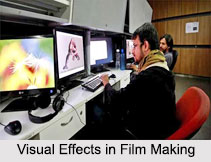 The art and science of Film Making has evolved in India and Indian Cinema, from its primitive age of "Raja Harishchandra", the 1913 silent film which was the country"s first full-length feature film, to the contemporary times of digital technology-oriented filmmaking, encompassing elements of arresting visual effects, action sequences and thrills. A positive welcoming attitude towards parallel cinema and artistic films with an intense degree of drama has been a revolutionary turnaround in Indian Cinema, paving the way for parallel cinema actors and filmmakers. The audience too has been increasingly welcoming such films, as against the time when merely mainstream commercial films were conceived to have an appeal.
The art and science of Film Making has evolved in India and Indian Cinema, from its primitive age of "Raja Harishchandra", the 1913 silent film which was the country"s first full-length feature film, to the contemporary times of digital technology-oriented filmmaking, encompassing elements of arresting visual effects, action sequences and thrills. A positive welcoming attitude towards parallel cinema and artistic films with an intense degree of drama has been a revolutionary turnaround in Indian Cinema, paving the way for parallel cinema actors and filmmakers. The audience too has been increasingly welcoming such films, as against the time when merely mainstream commercial films were conceived to have an appeal.
The process of filmmaking in India is the same as anywhere in the world, comprising 5 stages - Development, Pre-production, Production, Post-production and Distribution. The intermediary 3 stages constitute the actual production of the film from deciding the budgets and locations to the proper finishing of the shot scenes through editing and incorporation of background score and visual effects. The Development stage lays the very foundation for any film, from the very conception of its idea to manifesting the same into a complete screenplay, while Distribution is the thing of the time, where business aspects of advertising and promotion are addressed to bring in the audience and generate profitable revenue.
Film making studios are the facilities where films are shot, processed and completed for release. These film studios are owned and operated by film production companies, also let out on rent to companies who do not own their own studios. Bombay Talkies was the first Indian film production house and movie studio established in 1934 in the present suburb of Malad in Mumbai. The other well-known film studios include Film City, Filmistan, Mehboob Studio, R. K. Studio, Ramoji Film City, Wadia Movietone, YRF Studios and more.
Two important processes of filmmaking are scriptwriting and editing. Scriptwriting is a process of the Development stage, involving the drafting and finalisation of a proper script encompassing complete scenes which tell the story and are to be shot, together called the Screenplay of the film. Editing is a process during post-production, involving the assembling of the shots and scenes filmed, contouring into a whole feature film.
Two aspects that are considered revolutionary in Indian Cinema are Special Effects and evolution of Digital Cinema. The former are designed illusions that seamlessly simulate sequences that can only be imagined and not shot for real, while the latter is a path-breaking reel less approach to filmmaking and utilization of digital technology for distribution and projection of motion pictures, through optical disks, satellites and hard drives, replacing the conventional film projector with digital projector.






